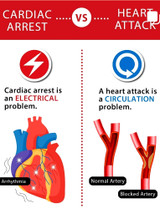Cardio Series

Cardiac Arrest vs a Heart Attack
Before I got into the EMS field, I thought that everyone who had a heart attack, passed out and stopped breathing. While that can happen it doesn't always turn out like that.
A heart attack is when there is a blockage of an artery on the heart.
Remember arteries go to the heart, these coronary arteries supply the heart itself with oxygenated blood, not to be dispersed but so the heart can beat.
When a blockage happens it can result in Pain, Nausea, Vomiting and Sweating. I remember them telling me in school. "If your patient is sweating and has chest pain, they can't fake the sweating. Have a high index of suspicion this is the real deal" but how do we know if it's a heart attack, or another cardiac issue?
Well sometimes you don't know till you get to the hospital, you must treat it as such. Most chest pain patients will be instructed to take 4 baby aspirin by dispatchers while EMS is on the way (as long as there's no allergy). Aspirin is an anti platelet, meaning it's a blood thinner. It allows the blood to thin and decreases the size of the clot that could or is forming.
This early intervention is key. When EMS gets there they will run an ECG. On it you can see based in the 12 lead, where the infarction (damage) is occurring on the heart (more on this tomorrow). After their test they determin the patient is having a heart attack.
Cardiac Arrest is when the heart is no longer beating. Cardiac Arrest can be caused by a heart attack if it goes untreated, because the heart muscle is dying while it is not perfused. Cardiac Arrest can also be secondary to airway complications.
What you as a lay person need to know is that if the person is conscious, and breathing it's not a Cardiac Arrest. Same as if you can feel a radial or carotid pulse. Do not do CPR, if a pulse is felt and the patient is breathing.
If they have a pulse and are conscious, call 911 immediately and follow prompts by the dispatcher.
Now if there is no pulse and the patient is not breathing and you are trained in BLS, begin compressions. You are the heart for that patient till EMS arrives. You are the only thing keeping the heart beating.
